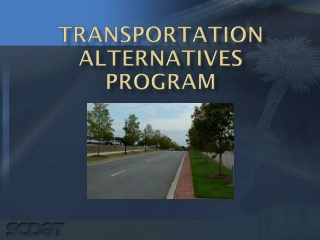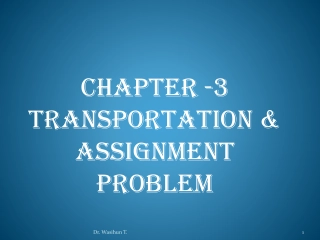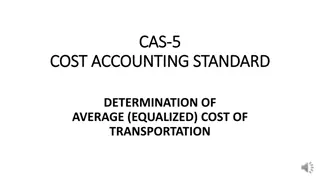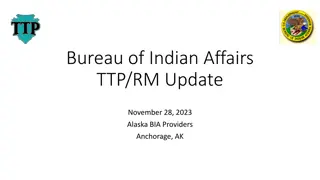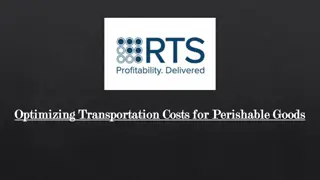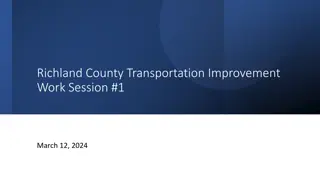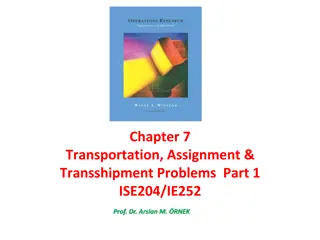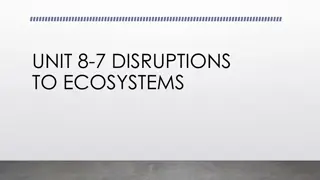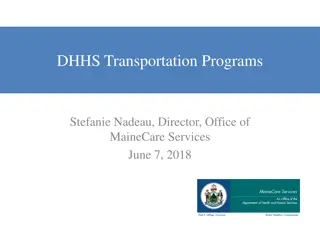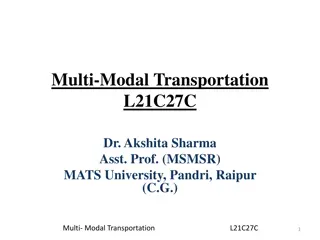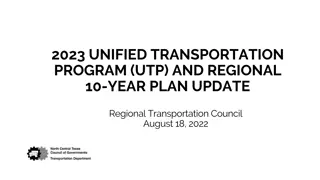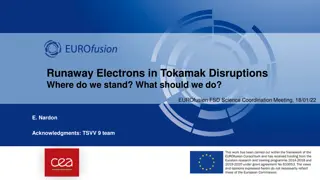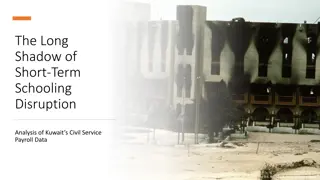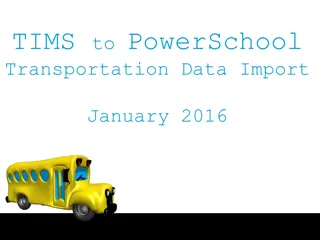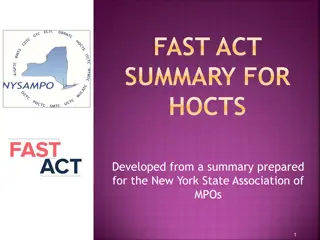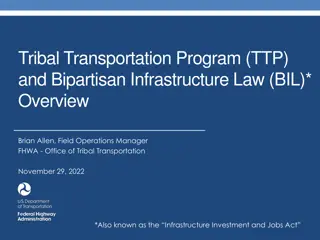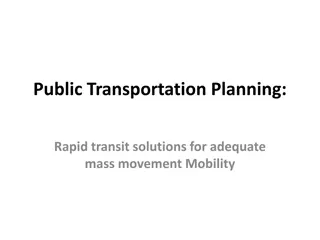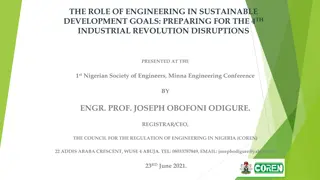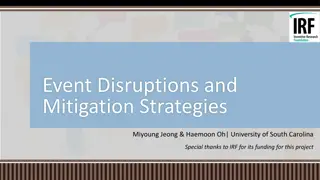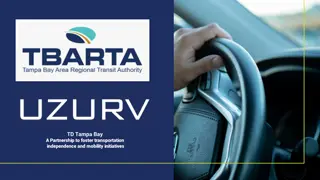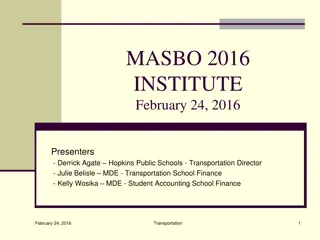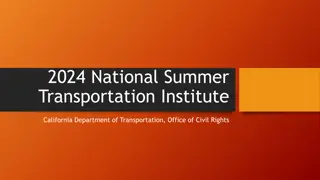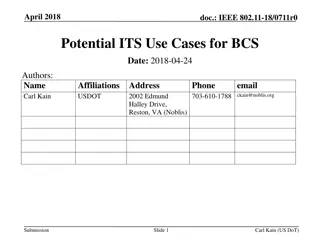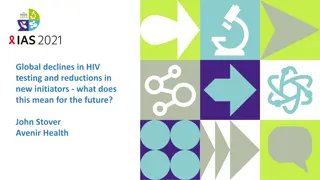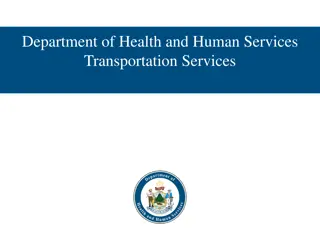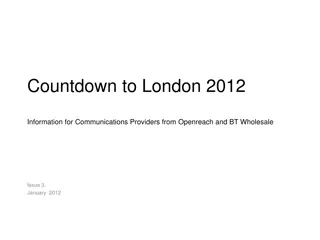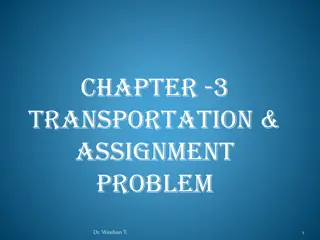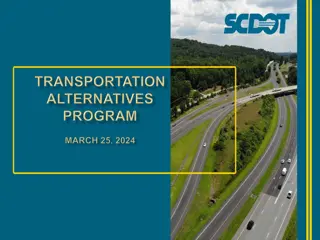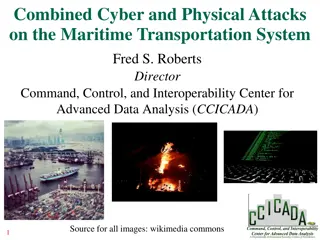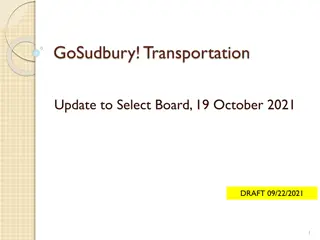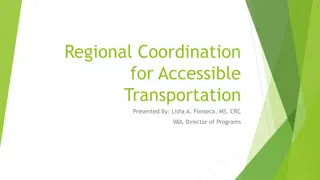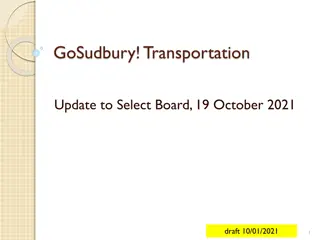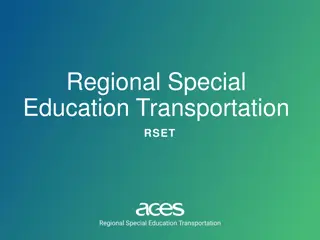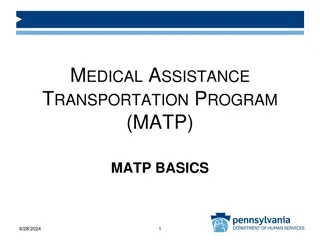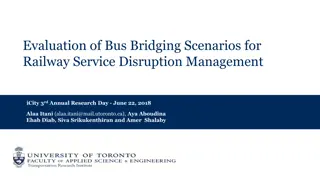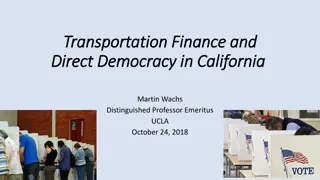Funding Opportunities for Non-Motorized Transportation in South Carolina
The US Department of Transportation's Federal Highway Administration provides funding to South Carolina through the Transportation Alternatives Program (TAP) to support non-motorized transportation initiatives. Local governments, schools, and other entities can partner with the South Carolina Depart
1 views • 21 slides
Transportation & Assignment Problem Overview
The transportation problem involves optimizing shipment costs from multiple sources to multiple destinations with known supply and demand constraints. This chapter discusses the characteristics of transportation problems, key assumptions, and how to formulate the transportation model. Dr. Wasihun T.
0 views • 64 slides
Enhancing Transportation Performance Management through TSMO Collaboration
Advancements in technology and evolving customer needs are driving changes in transportation management. Transportation Systems Management and Operations (TSMO) offers strategies to optimize operational performance, complementing traditional capacity projects. Collaboration between TSMO and Transpor
1 views • 77 slides
Cost Accounting Standards for Determining Transportation Costs
Understanding the importance of transportation costs in procurement and distribution, this guide outlines the standards for determining average costs, separation of transportation costs in accounting records, objectives for maintaining cost uniformity, components of transportation costs, and treatme
0 views • 11 slides
Update on BIA Transportation Programs in Alaska
The update covers the Bureau of Indian Affairs (BIA) Transportation Programs in Alaska, including funding details for the Tribal Transportation Program (TTP) and BIA Road Maintenance Program. It discusses the current funding status, upcoming appropriations, and maintenance activities on BIA-owned ro
0 views • 10 slides
Understanding Transportation Programs and Trends
Transportation training session led by Megan Johnson, featuring topics such as Transportation Crash Course, Training Opportunities, and Transportation Trends & Updates. Includes discussions on different types of transportation services and their importance for communities.
2 views • 38 slides
Optimizing Transportation Costs for Perishable Goods
In the realm of logistics, the transportation of perishable goods presents a unique challenge. From fresh produce to pharmaceuticals, these time-sensitive commodities require specialized handling and efficient transportation to maintain their quality and integrity. One of the critical aspects of man
2 views • 6 slides
Richland County Transportation Improvement Summary
Richland County's transportation improvement work includes sessions on project principles, funding options, project costs, and guidelines for utilizing the transportation penny. The focus is on addressing transportation needs, project prioritization, funding challenges, and division of funds for var
0 views • 19 slides
How to Manage Supply Chain Disruptions with BI Reporting Tools as Global Dynamics Shift
In this insightful blog, discover how Business Intelligence reporting tools can be your strategic asset in managing supply chain disruptions amidst changing global dynamics. Learn how these powerful tools help navigate through challenges posed by geopolitical tensions, pandemic recovery, and evolvin
1 views • 5 slides
Transportation Problem Modeling in Supply Chain Management
This content discusses the formulation and solution of transportation problems in the context of supply chain management, using a specific example of wheat transportation between grain elevators and mills. It covers the characteristics of transportation problems, linear programming model formulation
3 views • 55 slides
Transportation Planning and Data Collection Insights
Understanding transportation planning involves various stages such as data collection, study area definition, and selection of external cordon lines. Collecting data on existing travel patterns, transport facilities, and land use is crucial for formulating effective transportation plans. Defining th
0 views • 27 slides
Understanding Disruptions to Ecosystems and Human Impact
Evolution and ecosystem dynamics are shaped by interactions between organisms and their environment. Invasive species, unintended consequences, and human activities can disrupt ecosystems, leading to ecological changes. Examples include the impact of invasive species like zebra mussels in the Great
0 views • 12 slides
Maine DHHS Transportation Programs Overview
The Maine Department of Health and Human Services (DHHS) oversees various transportation programs aimed at providing non-emergency transportation services to low-income, child welfare-eligible, and Section 17-eligible individuals. These programs are managed through regional brokerage systems, with b
3 views • 5 slides
Understanding Multimodal Transportation in Logistics
Multimodal transportation involves using multiple modes of transportation for logistics and freight processes. It utilizes a combination of air, road, rail, water, and package carriers to efficiently move goods. Unlike intermodal shipping, multimodal shipping allows for flexibility in handling cargo
2 views • 119 slides
Regional Transportation Council's 2023 Unified Transportation Program Update
The Regional Transportation Council discussed updates to the 2023 Unified Transportation Program, focusing on Category 2 funding discrepancies, proposed project adjustments, development principles for the 10-Year Plan, and regional funding allocations for 2017-2023 UTPs. The plan emphasizes performa
1 views • 14 slides
Runaway Electrons in Tokamak Disruptions: Current Status and Future Directions
The article discusses the current knowledge and open questions regarding runaway electrons in tokamak disruptions, focusing on prospects for ITER tools and plans. It covers theoretical frameworks, RE generation mechanisms, validation models, and challenges in disruption scenarios. The need for self-
0 views • 20 slides
Long-Term Impacts of Schooling Disruptions in Kuwait
Analysis of Kuwait's Civil Service Payroll Data reveals that schooling disruptions, particularly during the Gulf War, have resulted in long-term consequences on individuals' education and earnings. Men and women of schooling age during the war experience lower earnings for each year of school lost,
2 views • 21 slides
Importing TIMS Transportation Data into PowerSchool
Explore the process of extracting, formatting, purging, and importing TIMS transportation data into PowerSchool for efficient management of student transportation information. This includes creating TIMS extracts, updating bus stop information, and optimizing transportation planning through geocodin
2 views • 43 slides
Overview of FAST Act for Transportation Planning
The FAST Act, passed in 2015, authorizes federal programs for transportation development with a focus on surface transportation. It extends funding through 2020, totaling $304.7 billion. The Act aims to enhance resiliency, reliability, and stormwater mitigation in transportation systems. Planning fa
2 views • 10 slides
Tribal Transportation Program & Bipartisan Infrastructure Law Overview
The Tribal Transportation Program (TTP) and Bipartisan Infrastructure Law (BIL) provide funding for essential transportation projects in Tribal communities. The TTP Bridge Fund, Safety Fund, and High Priority Projects aim to improve infrastructure and safety. The BIL funding for FY22-FY26 totals $3.
1 views • 13 slides
Efficient Public Transportation Planning for Mass Mobility
Rapid transit solutions like high-capacity public transportation systems, including overground rail, underground rail, trams, and BRT systems, play a crucial role in enhancing mass movement efficiency. Factors such as journey time, transport costs, vehicle operating costs, and the benefits of rapid
1 views • 20 slides
Engineering in Sustainable Development Goals Amidst 4th Industrial Revolution Disruptions
The role of engineering in sustainable development goals is crucial in preparing for the disruptions of the 4th industrial revolution. It involves optimizing excellence in nature, building skills, addressing societal demands through research and innovation, and adapting to the evolving technological
0 views • 60 slides
Event Disruptions and Mitigation Strategies: A Study on Meeting Planning Business
This study explores the impact of event disruptions on the meeting planning business, highlighting the types, causes, and mitigation strategies for disruptions. The research reveals the necessity of strong relationships and cooperation with partners to navigate disruptions successfully.
0 views • 12 slides
TD Tampa Bay - Enhancing Transportation Independence and Mobility Initiatives
TD Tampa Bay partnership aims to increase access to essential services, enhance regional connectivity, and provide on-demand transportation services for transportation disadvantaged individuals in the TBARTA region. The initiative includes innovative solutions like cross-county and evening/weekend t
1 views • 9 slides
School Transportation: Overview and Best Practices
Explore the key aspects of school transportation including safety, efficiency, cost control, fairness, and more. Understand district responsibilities, priorities, methods of providing transportation, policies, and statutory regulations. Discover the pros and cons of district-owned busing versus cont
1 views • 41 slides
National Summer Transportation Institute (NSTI) Program Overview
The National Summer Transportation Institute (NSTI) program, established by the Federal Highway Administration and Department of Transportation, aims to increase student interest in transportation careers and STEM fields. It offers a 2-4 week immersive experience at accredited colleges, focusing on
2 views • 18 slides
Potential Intelligent Transportation System Use Cases for Broadcast Services Study Group
This presentation highlights potential Intelligent Transportation System use cases for consideration by the Broadcast Services Study Group. The use cases were derived from the Architecture Reference for Cooperative and Intelligent Transportation (ARC-IT). While not exhaustive, the presentation provi
1 views • 19 slides
Impact of Global Declines in HIV Testing and Service Disruptions on Future Healthcare
Global declines in HIV testing and reductions in new initiators, coupled with disruptions in HIV services due to COVID-19, pose challenges for future healthcare. Short-term disturbances could lead to increased HIV-related mortality, emphasizing the need for program responses to mitigate adverse effe
0 views • 10 slides
DHHS Coordination of Transportation Service Contracts Overview
The Department of Health and Human Services in Maine conducted an assessment of Transportation Services in June 2019. The workgroup identified three main priorities: alignment of Quality and Performance Measures, Safety Measures, and Evaluation of Transportation Services. The first priority involves
0 views • 28 slides
Information for Communications Providers from Openreach and BT Wholesale for London 2012
Countdown to London 2012 provides essential details for communications providers regarding order timelines and navigating around transportation disruptions during the Olympic and Paralympic Games. It emphasizes the importance of early planning and cooperation to ensure smooth operations and customer
0 views • 21 slides
Understanding Transportation and Assignment Problem
Transportation and assignment problems involve optimizing the shipment of goods from various sources to multiple destinations while minimizing total transportation costs. These problems deal with limited supply, known demand, constant shipping costs, and integer quantities. The transportation algori
0 views • 64 slides
Enhancing Transportation Infrastructure Through Federal Funding Programs
The Transportation Alternatives Program (TAP) funded by the USDOT's Federal Highway Administration supports transportation projects in South Carolina based on population categories. TAP funds are allocated to Transportation Management Areas (TMAs), Small Urban Areas, and Non-Urban Areas, prioritizin
0 views • 21 slides
Combined Cyber and Physical Attacks on Maritime Transportation System
Attacks on the maritime transportation system involve a combination of cyber and physical methods, posing significant threats to global commerce. Cyber vulnerabilities, such as hacking security cameras or spreading fake news, can lead to physical intrusions and disruptions. More sophisticated attack
0 views • 22 slides
Addressing Transportation Gaps in Sudbury: A Livable Community Approach
The Sudbury Transportation Committee, established by the Select Board, aims to enhance transportation in Sudbury to create a livable community. Focusing on inclusivity, equity, and addressing transportation gaps impacting various aspects of livability, the initiative seeks to improve social particip
0 views • 16 slides
Understanding Regional Coordination for Accessible Transportation
This presentation delves into the concept of regional coordination in accessible transportation, focusing on the Regional Transportation Advisory Panel, 5-year regional transportation goals, and the significance of the Safe, Accountable, Flexible, Efficient Transportation Equity Act. It emphasizes t
0 views • 16 slides
Enhancing Livability in Sudbury Through Transportation Initiatives
The GoSudbury! Transportation Update to the Select Board on October 19, 2021 highlights the importance of addressing transportation as a key component of livable communities. The initiative aims to create a safe, secure, and inclusive environment by improving transportation options for residents of
0 views • 26 slides
Regional Special Education Transportation (RSET) Program Overview
RSET, which stands for Regional Special Education Transportation, is an initiative developed by ACES to help districts save money while safely transporting students to out-of-district placement sites. The program benefits districts by reducing transportation costs, addressing parent concerns, and ma
0 views • 13 slides
Understanding Pennsylvania's Medical Assistance Transportation Program (MATP)
The Medical Assistance Transportation Program (MATP) in Pennsylvania provides essential transportation services to access medical care. Governed by state plans and codes, MATP aims to offer access to medical, pharmacy services, chronic disease management, and preventative care. Transportation provid
0 views • 16 slides
Evaluation of Bus Bridging Scenarios for Railway Service Disruption Management
Public transit disruptions can greatly impact user experience, prompting transit agencies to implement various strategies such as bus bridging. This research evaluates different bus bridging scenarios for railway service disruptions, aiming to develop a decision support tool for transit agencies to
0 views • 18 slides
Transportation Finance and Direct Democracy in California
Proposition 6 on November 6th has garnered attention, but voters in multiple states will decide on over 250 transportation ballot measures totaling over $55 billion. California, with a longer history and greater funding needs, has been at the forefront of transportation investments, including the us
0 views • 29 slides
